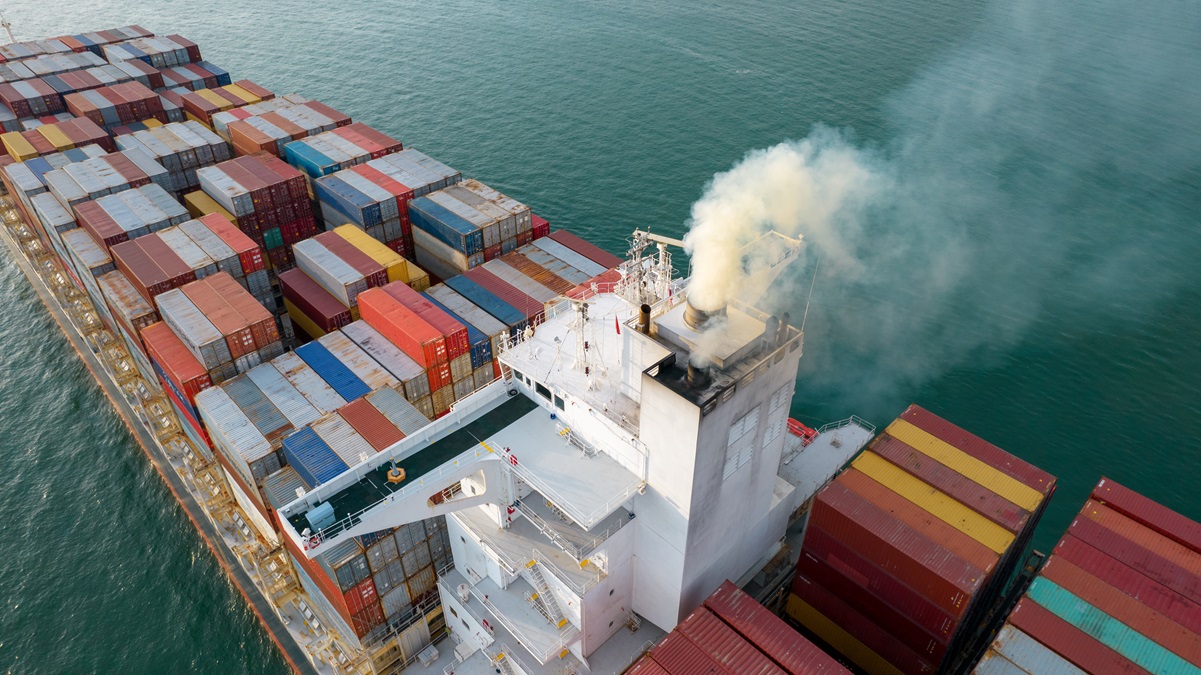Shipping is international in nature. A just and equitable transition is necessary as the sector eyes a low-carbon future with sustained economic growth.

© Shutterstock/ GreenOak
Maritime transport is in the spotlight at COP28, the UN’s annual climate change conference that kicked off on 30 November in Dubai.
The sector, which carries around 80% of the world’s merchandise trade, is under pressure to decarbonize.
The shipping industry emits around 3% of global greenhouse gas emissions (GHG). Over the past decade, its emissions have risen 20% – a trajectory the world “simply cannot afford”, UNCTAD Secretary-General Rebeca Grynspan said.
“Our message at COP28 is very clear. Bold global action is necessary to decarbonize shipping,” Ms. Grynspan said.
“But shipping cannot decarbonize on its own,” she added. “It requires action across the entire ecosystem.”
A new UNCTAD policy brief calls for bringing together carriers, ports, manufacturers, shippers, investors, energy producers and distributors to collectively help the industry decarbonize and ensure the process is just, fair and equitable.
Uncertainty is delaying investments
The brief highlights that uncertainty over regulations and alternatives to fossil fuels are delaying the required investments.
Estimates show that decarbonizing the world’s fleet by 2050 could cost $8 billion to $28 billion annually, with an additional $28 billion to $90 billion needed each year for the carbon-neutral fuel infrastructure.
The hefty price tag could raise shipping costs, which would affect the global economy.
A 2023 UNCTAD simulation shows that hypothetical increases in maritime logistics of 10%, 30% and 50% could lower global GDP by 0.01%, 0.04% and 0.08%, respectively.
In monetary terms, a 0.08% drop in global GDP, valued at $104 trillion in 2022, would translate into approximately $80 billion in losses to the global economy.
Vulnerable economies hit hardest by rising costs
While all economies would feel the effects of higher shipping costs, the impact would be more pronounced on small island developing states and least developed countries. These countries, which rely heavily on maritime transport, are already burdened by higher shipping costs and have limited resources to cope with price hikes.
“If decarbonization efforts are not accompanied by economic growth, sound multilateral regulation and technological innovation, there is a risk that it will leave behind in the short term exactly those countries that it stands to help the most in the long term,” Ms. Grynspan said.
Policy recommendations to strike a balance
The UNCTAD policy brief outlines four recommendations to help the maritime industry balance economic, environmental and regulatory goals and concerns.
- Establish a universal regulatory framework applicable to all ships, regardless of their flag of registration, country of ownership or area of operation, to avoid a two-speed decarbonization process and fragmented solutions and exemptions that distort the level playing field for shipping and trade.
- Implement regulations that help minimize uncertainty, which currently hinders the investment decisions of shipowners, shipyards and ports.
- Encourage investors and financial institutions to substantially boost funds for research and development in clean-fuel shipping technologies and infrastructure.
- Introduce a levy on fuels or carbon price to make alternative fuels more competitive, while generating funds that can help smaller and vulnerable economies to achieve a green and just low-carbon transition.
New partnership to further assess the impacts
UNCTAD and the International Maritime Organization (IMO) announced on 1 December at COP28 a new partnership to further assess the potential impact of decarbonization on maritime logistics, particularly in developing countries.
This includes a comprehensive examination by UNCTAD of how a basket of mid-term measures – including maritime GHG pricing mechanisms, currently under negotiation at the IMO – can potentially affect countries’ trade, GDP and consumer prices.
The project, benefitting from $500,000 from the IMO, will run through March 2025. It aims to support global consensus-building towards a low-carbon future for shipping and reduce uncertainty for investors.


